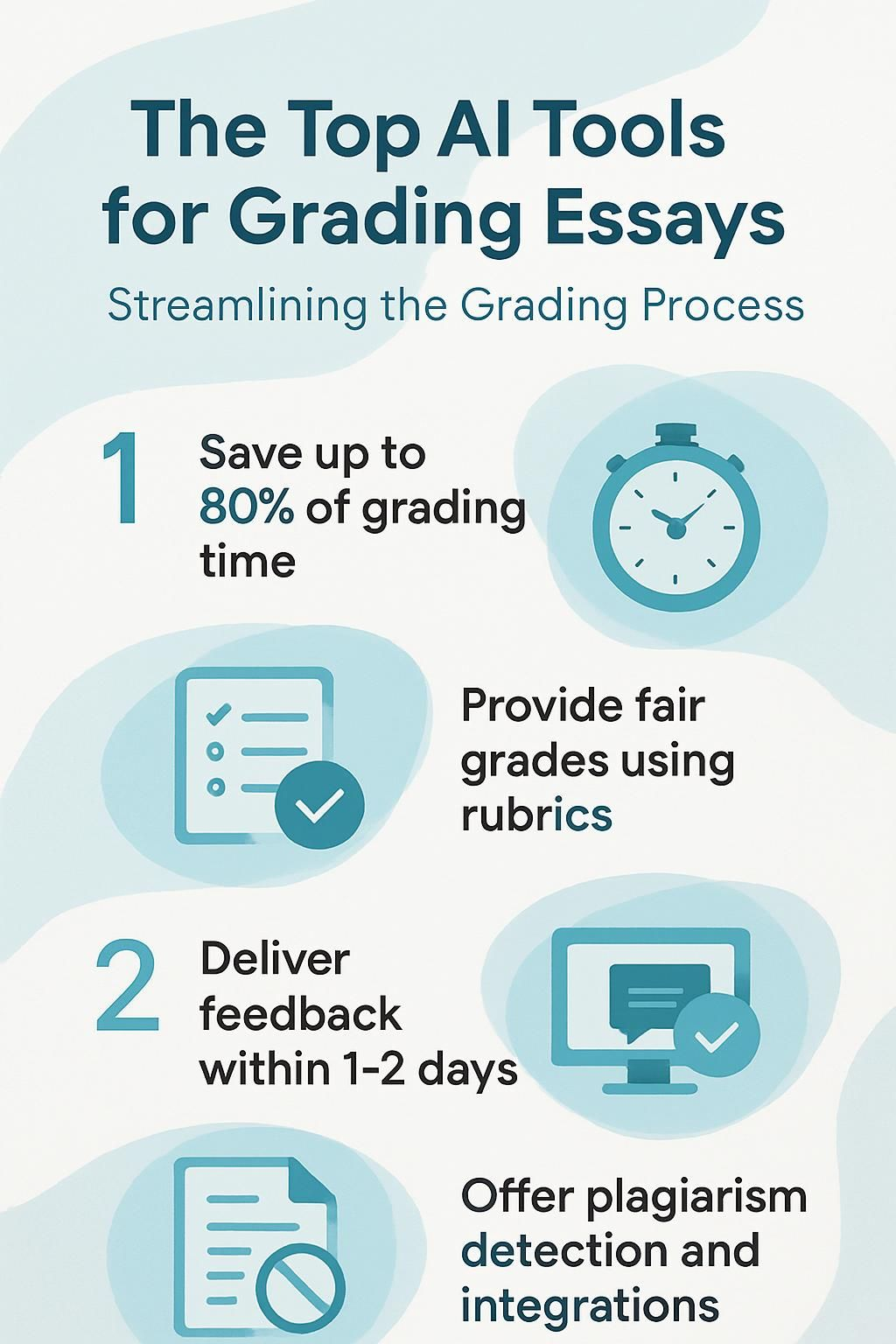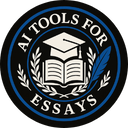Grading essays can take up a lot of time and energy for teachers. AI tools for grading essays make this process faster and easier. These tools help ensure fair grading while giving students better feedback to improve their writing.
Keep reading to discover the best AI tools that can transform your grading routine!
Key Takeaways
- AI tools like CoGrader, Gradescope, Turnitin Feedback Studio, and SnapGrader save teachers up to 80% of grading time by automating tasks.
- Tools provide fair grades using rubrics like Texas STAAR and Florida B.E.S.T., reducing bias and ensuring consistency.
- Instant feedback (1–2 days) helps students improve writing faster compared to weeks-long traditional methods.
- Features like plagiarism detection (Turnitin), multilingual support, and Google Classroom integration simplify the process for diverse classrooms.
- Strict privacy rules like FERPA compliance protect student data while ensuring academic integrity standards are met.

Key Benefits of Using AI Tools for Grading Essays
AI tools make grading faster and easier. They provide fair scores and helpful tips for students to improve their writing.
Time efficiency and faster grading
Teachers save up to 80% of grading time with tools like CoGrader. These AI essay graders handle repetitive tasks, reducing mental fatigue and freeing up educators for other duties.
Feedback turnaround drops from weeks to just 1-2 days. This fast response keeps students engaged in writing assessments and helps them track their progress quickly. As a bonus, CoGrader offers free testing during its beta phase—giving teachers a chance to experience efficiency without upfront costs.
Consistency and fairness in evaluation
AI essay graders promote fairness by reducing human bias. These tools follow rubric-based systems and ensure every student is evaluated the same way. CoGrader, for example, supports major rubrics like the Common Core State Standards (CCSS) and Texas Essential Knowledge and Skills (TEKS).
This keeps grading objective while respecting predefined expectations.
By following strict standards like FERPA compliance and SOC2 TYPE 1 protocols, AI tools also protect student data during assessments. Educators retain final control but benefit from reliable scoring across diverse student submissions.
Actionable feedback becomes easier to provide with these automated systems in place.
Actionable feedback for students
Actionable feedback helps students grow. AI tools provide personalized comments based on their essays. CoGrader, for example, evaluates writing and pinpoints areas to improve. It identifies grammar issues, unclear ideas, or weak arguments quickly.
This kind of targeted advice empowers students to fix mistakes and sharpen skills.
Timely feedback is critical for learning progress. Tools like Turnitin Feedback Studio deliver suggestions almost instantly after submission. Teachers can also add custom rubrics to focus on specific writing standards like Texas STAAR rubrics or AP/IB guidelines.
Clear guidance builds confidence and boosts performance over time—helping each student excel in their own way.
CoGrader: Simplifying Grading for Teachers
Grading essays can be tiring and slow, but CoGrader makes it faster and easier. This tool offers smart features to improve how teachers give feedback.
Features & Benefits of CoGrader
CoGrader makes essay grading faster and smarter. This AI tool helps teachers save time while giving useful feedback.
- Provides actionable feedback for students to improve their writing skills.
- Analyzes essays with consistency, reducing bias in grading.
- Detects academic integrity issues like plagiarism accurately.
- Integrates with Google Classroom, Moodle, Blackboard, and other learning management systems (LMS).
- Supports multiple languages for diverse classrooms.
- Aligns assessments with state standards such as Florida B.E.S.T., Texas TEKS, and New York Regents.
- Offers FERPA compliance to ensure student privacy is protected.
- Supports custom rubrics to fit specific classroom needs perfectly.
- Tracks student writing progress over time through detailed analytics.
- Helps teachers handle large volumes of essays efficiently without compromising quality evaluation.
How CoGrader Enhances Feedback
This tool accelerates feedback, reducing turnaround time to 1–2 days. It evaluates essays using specific rubrics like AP/IB or state standards such as Texas STAAR and Florida B.E.S.T., ensuring impartial grading.
Teachers gain class analytics that identify learning gaps. This information aids in lesson planning and supports writing standards.
Students gain from meaningful essay feedback aligned with their needs. The AI essay grader pinpoints areas for improvement and offers suggestions, fostering development in student writing skills.
Its multilingual support guarantees equity in diverse classrooms while maintaining privacy through FERPA compliance measures.
Gradescope: Advanced Grading and Plagiarism Detection
Gradescope saves time and ensures accurate grading. It also helps detect plagiarism with its advanced tools.
Features & Benefits of Gradescope
Gradescope is a well-known AI essay grader. It helps teachers save time and enhance grading precision.
- Offers rubric-based grading, ensuring consistent and fair evaluation for all students.
- Includes advanced plagiarism detection, helping uphold academic integrity in student work.
- Works seamlessly with Google Classroom, simplifying the grading process for educators already using this platform.
- Facilitates bulk upload of assignments, saving time by processing multiple essays simultaneously.
- Delivers actionable feedback to students, fostering writing progress and improvement over time.
- Monitors class analytics to give teachers insights into overall performance trends and areas requiring attention.
- Maintains student privacy through FERPA compliance, securely protecting sensitive data.
- Features accessibility options so all users can benefit from the tool equally.
Next, learn how Turnitin Feedback Studio supports comprehensive grading solutions!
Why Teachers Prefer Gradescope
Gradescope ensures fair and objective grading. Its AI-driven tools reduce bias by providing consistent assessments. Teachers can use features like custom rubrics for clear, standard evaluations.
This streamlines the process while keeping teacher judgment intact.
It also helps protect student privacy with strict compliance measures like FERPA and SOC2 Type 1 standards. With plagiarism checking and class analytics, teachers save time on grading essays.
Gradescope allows focus on important tasks like student writing progress and personalized feedback.
Turnitin Feedback Studio: Comprehensive Grading Support
Turnitin Feedback Studio makes essay grading smooth and efficient. It helps teachers check for originality and give clear feedback.
Features & Benefits of Turnitin Feedback Studio
Turnitin Feedback Studio helps teachers grade essays quickly and fairly. It also protects academic integrity with advanced tools.
- Offers top-notch plagiarism detection to ensure originality in student work.
- Provides personalized feedback to help students improve their writing skills.
- Supports rubric-based grading, making evaluations consistent and clear.
- Integrates with Google Classroom and Canvas LMS for seamless use by educators.
- Tracks student writing progress over time for better teaching insights.
- Ensures compliance with FERPA and SOC 2 Type 1 standards to protect student data.
- Adapts to multilingual education needs for diverse classrooms worldwide.
- Aligns with Texas STAAR rubrics, Florida B.E.S.T. standards, AP/IB rubrics, and other frameworks for accurate grading.
Plagiarism Detection and Insights
The tool checks for plagiarism with advanced AI. It scans essays against a massive database of texts, academic papers, and online content. This ensures originality in student submissions and upholds academic integrity.
It offers actionable feedback by highlighting unoriginal text and improper citations. Teachers can quickly identify learning gaps in writing or research skills. These insights save time while promoting better writing standards among students.
SnapGrader: Instant Feedback and Analytics
SnapGrader speeds up grading with instant results. It offers insights to help teachers track student progress easily.
Features & Benefits of SnapGrader
SnapGrader makes essay grading faster and easier for teachers. It provides real-time feedback and analytics, ideal for busy classrooms.
- Delivers instant feedback to students, helping them improve writing skills quickly.
- Tracks student writing progress with detailed class analytics and visual reports.
- Detects errors across multiple question types, boosting accuracy in evaluation.
- Supports multilingual education, ensuring diverse student needs are met.
- Integrates with Google Classroom for seamless workflow management.
- Ensures security compliance with FERPA and SOC2 Type 1 standards to keep data safe.
- Simplifies scaling for large class sizes by automating repetitive tasks like grading essays or quizzes.
- Offers payment methods including credit cards, purchase orders, and institutional licenses for flexible access.
- Provides actionable essay feedback based on industry rubrics like TEKS, Florida B.E.S.T., and AP/IB frameworks.
- Gives teachers greater reliability through advanced data protection features like OAuth2 authentication across devices.
- Highlights academic integrity concerns with AI detector tools that identify generated text efficiently.
- Enhances teacher judgment by combining human insights with automated grading tools to strike a balance between fairness and objectivity.
Streamlining Grading with Real-Time Insights
AI tools like SnapGrader provide instant feedback and grading analytics. They highlight student writing progress and pinpoint learning gaps. Teachers gain actionable data to guide lesson planning quickly.
This saves time and improves teaching precision.
Class analytics offer insights into writing standards, helping schools meet academic goals like Florida B.E.S.T. Standards or Texas STAAR Rubrics. Such tools support multilingual education while ensuring FERPA compliance to protect student privacy.
Reflections on Using AI Tools for Grading Essays
AI essay graders like CoGrader and Gradescope have transformed grading. Teachers save up to 80% of the time they usually spend on essays. Instead of weeks, feedback is ready in just 1-2 days.
This speed helps students act quickly on suggestions and improve their writing faster. These tools ensure fairness by reducing bias during evaluation. Consistent scoring boosts trust among teachers and students alike.
Student privacy also stays secure with these tools. CoGrader follows strict rules like FERPA compliance and SOC2 TYPE 1 standards to protect sensitive data. It even supports major grading systems, such as Texas STAAR rubrics and Florida B.E.S.T.
Standards, making it versatile for classrooms nationwide. By offering personalized feedback tied directly to state standards, these platforms guide student progress while respecting academic integrity policies fully.
Conclusion
Grading essays just got easier with tools like CoGrader, Gradescope, Turnitin Feedback Studio, and SnapGrader. These tools save time and give fair, clear feedback to students. Teachers can focus on teaching while providing better support for student growth.
With features like Google Classroom integration and state test alignment, these AI tools help meet today’s educational needs. Try them to make grading faster and smarter!
For more in-depth insights, read our reflection paper on leveraging AI tools for essay grading.


Leave a Reply